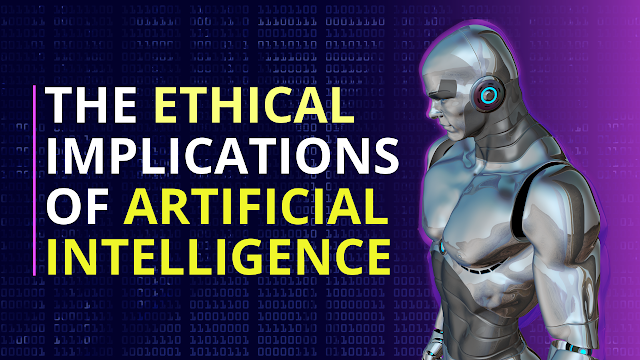Introduction:
Artificial Intelligence (AI) and automation have emerged as powerful technologies that are transforming various aspects of our lives. From personalized recommendations to autonomous vehicles, AI and automation have the potential to revolutionize industries and enhance efficiency. However, along with their promising capabilities, these technologies also raise important ethical considerations. In this blog post, we will delve into the ethical implications of AI and automation, exploring the challenges and concerns that arise as these technologies continue to advance.
Bias and Discrimination:
AI systems heavily rely on data to make decisions, and if the data used to train these systems is biased, it can lead to discriminatory outcomes. This bias can perpetuate social inequalities and reinforce discriminatory practices. It is crucial to address bias in AI algorithms and ensure fairness and inclusivity in their development and deployment.Privacy and Data Security:
AI and automation require vast amounts of data to operate effectively. This raises concerns about the privacy and security of personal information. As AI systems collect, store, and analyze data, it becomes essential to establish robust safeguards to protect individuals' privacy and prevent misuse of sensitive information.Job Displacement and Economic Impact:
Automation has the potential to significantly impact the workforce, leading to job displacement and changes in the labor market. While automation can enhance productivity and create new job opportunities, it is important to address the potential social and economic consequences of job losses and ensure a smooth transition for workers affected by automation.Accountability and Transparency:
AI systems often operate as black boxes, making it challenging to understand how they reach specific decisions. This lack of transparency raises concerns regarding accountability and the ability to address errors or biases in the system. Developing mechanisms to ensure transparency and accountability in AI algorithms is crucial to build trust and mitigate potential risks.Autonomous Systems and Human Oversight:
As AI systems become more advanced, the emergence of autonomous systems raises questions about the level of human oversight and control. The ability of AI systems to make decisions without direct human intervention can lead to complex ethical dilemmas. Striking the right balance between autonomy and human involvement is essential to ensure responsible and ethical deployment of AI technologies.Impact on Social Dynamics:
AI and automation can influence social dynamics in various ways. For instance, the use of AI in social media algorithms can shape people's opinions and preferences, potentially leading to filter bubbles and echo chambers. Understanding the impact of AI on social dynamics and taking measures to mitigate negative consequences is crucial to maintain a healthy and inclusive digital society.Ethical Decision-Making:
AI systems are increasingly being entrusted with making decisions that have significant consequences for individuals and society. This raises questions about the ethical frameworks and principles that should guide AI decision-making. Discussing topics such as transparency, accountability, and the incorporation of ethical considerations into AI algorithms is essential to ensure responsible and morally sound outcomes.Weaponization and Autonomous Weapons:
The development of autonomous weapons powered by AI raises ethical concerns regarding the potential for misuse and the lack of human control. Debates surrounding the ethics of autonomous weapons, including questions about the initiation of lethal force and the ability to distinguish between combatants and civilians, highlight the need for international regulations and frameworks to govern their deployment.Psychological and Emotional Impact:
AI technologies, such as chatbots and virtual assistants, are designed to interact with humans on a personal level. However, this raises concerns about the potential psychological and emotional impact on individuals. Discussing the ethical considerations of designing AI systems that prioritize user well-being, respect boundaries, and provide appropriate emotional support can foster responsible and empathetic AI development.Environmental Impact:
As AI and automation become more prevalent, their environmental impact becomes a concern. Large-scale data centers and energy-intensive computations contribute to carbon emissions. Developing sustainable practices and energy-efficient algorithms can help mitigate the environmental footprint of AI technologies.Ownership and Intellectual Property:
The creation and development of AI systems raise complex questions regarding intellectual property rights and ownership. Determining the ownership of AI-generated work and establishing frameworks for fair distribution of benefits and incentives are important ethical considerations in the realm of AI and automation.Impact on Human Skills and Creativity:
Automation can streamline repetitive tasks, but it may also impact human skills and creativity. Discussing the potential consequences on human development, fostering lifelong learning, and encouraging the cultivation of uniquely human traits such as creativity, critical thinking, and empathy can ensure a balanced integration of AI and automation into society.Global Equity and Access:
There is a concern that AI and automation may exacerbate existing inequalities on a global scale. Access to AI technologies, resources, and opportunities should be considered to avoid creating or widening the digital divide. Ethical discussions should focus on ensuring equitable access, considering diverse cultural contexts, and avoiding the concentration of power in the hands of a few entities or countries.Conclusion:
While the advancements in AI and automation hold great promise, it is imperative to navigate the ethical implications associated with these technologies. Addressing concerns such as bias, privacy, accountability, and social impact will be essential to ensure that AI and automation are developed and deployed in a responsible and ethical manner. By engaging in thoughtful discussions and implementing appropriate safeguards, we can harness the power of AI and automation while upholding our values and promoting a more equitable and inclusive future.


Useful information ☺️
ReplyDelete